Image source - Arabs for Christ at FreeBibleImages.org - Used under license 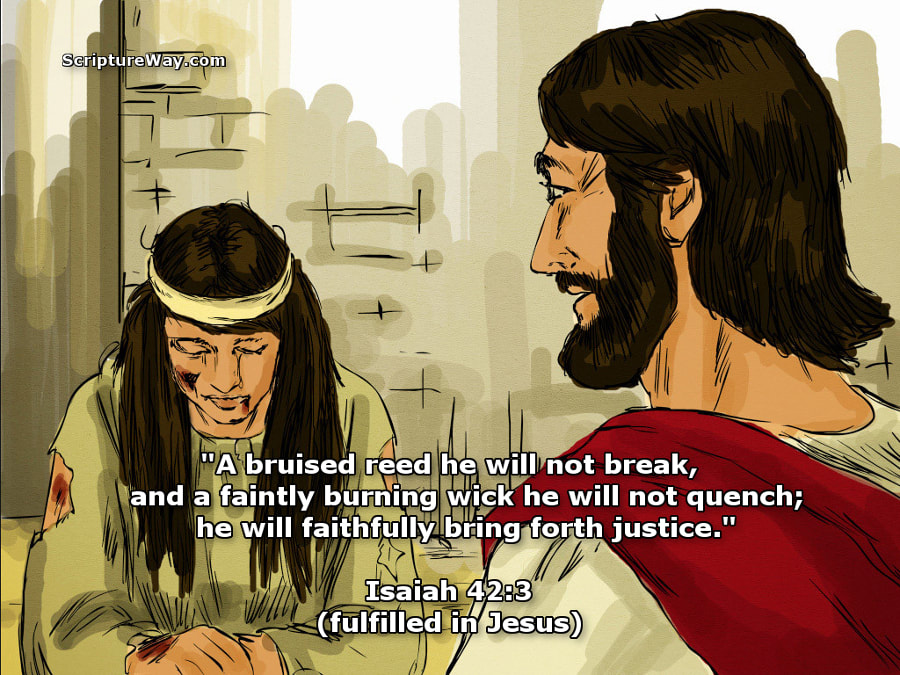 "And Jesus said, 'Neither do I condemn you; go, and from now on sin no more.'" (John 8:11) "And Jesus said, 'Neither do I condemn you; go, and from now on sin no more.'" (John 8:11)
"A bruised reed he will not break, and a faintly burning wick he will not quench; he will faithfully bring forth justice." (Isaiah 42:3)
"A bruised reed he will not break, and a smoldering wick he will not quench, until he brings justice to victory." (Matthew 12:20)
This lesson explains the meaning of the three phrases from Isaiah 42:3 -- "A bruised reed he will not break," "A faintly burning wick he will not quench," and "He will bring forth justice" which Matthew quoted in Matthew 12:20.
Consider. Are you a "bruised reed" (emotionally, spiritually, physically) needing the mending of Jesus? Come to him. Jesus specializes in mending broken lives.
The Bible verse quotations in this lesson are taken from the English Standard version (ESV) unless noted otherwise (Ref. 1).
1. "A bruised reed he will not break"
Jesus, our Savior, mends broken lives. Instead of "breaking" (or discarding) people who are weak morally, physically, or spiritually, Jesus strengthens them and binds them up (Ref. 2). Instead of dealing roughly with us when we come to him in our weakness, Jesus is tender and uses all gentleness and kindness toward us.
Example
Consider the account of the woman caught in adultery (the "bruised reed" in this example). The scribes and Pharisees brought her to Jesus seeking to stone her to death (John 8:1-11). Jesus made the woman's accusers realize their own sinful condition, and the scribes and Pharisees left the scene without casting a stone at the woman (John 8:5-9). Then, without condemning her or further "breaking" her, Jesus spoke with her tenderly as follows. "'Woman, where are they? Has no one condemned you?' She said, 'No one, Lord.' And Jesus said, 'Neither do I condemn you; go, and from now on sin no more'" (John 8:10-11).
Biblical Background
The prophet Isaiah, writing several hundred years before Christ, prophesied about the Servant who was to come (Isaiah 42:1-4). In Isaiah 42:1, God says "I have put my Spirit upon him." This prophecy was fulfilled at Jesus' baptism (Matthew 3:16-17). In Isaiah 42:3, the prophet says, "A bruised reed he will not break, and a faintly burning wick he will not quench; he will faithfully bring forth justice."
Matthew, the disciple of Jesus and the gospel writer, witnessed Jesus and his ministry. In Matthew 12:17, Matthew observed that Jesus fulfilled Isaiah's prophecy in Isaiah 42:1-4. In Matthew 12:18-21, Matthew quotes (and in places paraphrases) Isaiah 42:1-4. When Matthew stated in Matthew 12:17 that Jesus fulfilled Isaiah's prophecy, Matthew had just witnessed Jesus healing and restoring the man with the withered right hand (Matthew 12:9-14, Luke 6:6-11). That man also was an example of a "bruised reed" that Jesus restored. After Jesus healed him, the man, who likely was a mason or plasterer by trade, could return to working with his hands again for a living instead of begging bread (Ref. 3, Ref. 4). Matthew also had observed that multitudes of people -- including Gentiles (non-Jews) -- came to Jesus, and Jesus healed them all (Matthew 12:15, Mark 3:7-8). Jesus' ministry of healing and restoring "bruised reeds" then and today was and is for all people. That is good news. Biblical Meaning of "Bruised Reed" Reeds on the Side of the Jordan River Flowing into the Sea of Galilee - iStock Photo - Used under license Reeds on the Side of the Jordan River Flowing into the Sea of Galilee - iStock Photo - Used under license
Reeds are leafy cane plants that grow in watery or marshy areas. (See the picture of reeds near the Jordan river) (Ref. 5). However, scripture refers to reeds as fragile, weak, easily waved by the wind, easily broken, and unreliable when used as a staff (2 Kings 18:21, Matthew 11:7).
In Isaiah 42:3 the Hebrew word translated as "bruised" means broken or crushed but not entirely broken off (Ref. 6, Ref. 7). Thus, the words, "bruised reed," refer to a person who has been crushed or broken down by a sense of sin, by calamity, or by affliction (Ref. 7).
Good news
The good news is that Jesus Christ, the Messiah, does not break, consider useless, or discard people who are "bruised" emotionally, spiritually, or physically (Matthew 12:20). Instead, Jesus forgives our sins, tenderly binds up our wounds, and cares for us. Consider the multitudes of people who came to Jesus. The scripture says, "And many followed him, and he healed them all" (Matthew 12:15).
Similar verses
"The Lord is near to the brokenhearted and saves the crushed in spirit." (Psalm 34:18)
"He heals the brokenhearted and binds up their wounds." (Psalm 147:3) 2. "A faintly burning wick he will not quench"
When Jesus encounters people whose faith has dimmed or who have lost hope because of the hard knocks of life, Jesus does not ignore, discard, or "extinguish" us. Jesus nourishes the feeble flame, and rekindles our faith so his light in us shines brightly again.
Example
Consider the example of the man whose son had an unclean spirit which made his son mute, seized him, and threw him down in convulsions (Mark 9:14-29). The man is an example of a "smoldering wick" whose faith was dimming from the long-term afflictions of his son. The boy's father explained to Jesus that he had brought his son to Jesus' disciples, and they were not able to cast out the unclean spirit (Mark 9:18). That must have been terribly disappointing. Jesus asked that the boy be brought to him (Mark 9:19). When the boy was brought to Jesus, the unclean spirit -- seeing Jesus -- immediately threw the boy into convulsions (Mark 9:20).
The man's despair and weak faith is evident in the next verses. Jesus asked the boy's father, "How long has this been happening to him?" And he said, "From childhood. And it has often cast him into fire and into water, to destroy him. But if you can do anything, have compassion on us and help us" (Mark 9:21-22). "And Jesus said to him, 'If you can'! All things are possible for one who believes'" (Mark 9:23). "Immediately the father of the child cried out and said, 'I believe; help my unbelief!'" (Mark 9:24). Note that the man cried out to Jesus in his despair and asked Jesus to help him believe. Jesus answered the man's plea. Jesus rekindled the faith of this man who was a "faintly burning wick." Jesus commanded the unclean spirit to come out of the man's son, and the boy arose -- healed (Mark 9:25, 27). A smoldering wick (or smoking flax) Close-up of a smoldering wick - Alamy photo - Used under license Close-up of a smoldering wick - Alamy photo - Used under license
A smoldering or faintly burning wick of a lamp is just barely burning before the fuel runs out (Matthew 25:8). The King James Version in both Isaiah 42:3 (KJV) and Matthew 12:20 (KJV) refers to the faintly burning or smoldering wick as "smoking flax." In ancient lamps, the wick was a few strands of flax fiber or twisted cotton thread (Ref. 8).
The Good News
Jesus does not give up on us or chastise us when our faith becomes weak because of the calamities of life. Jesus cherishes the feeble flame, ministers to us the "oil" of grace, and through the Holy Spirit, rekindles our faith in him.
Example verses
"Let your light shine before others, so that they may see your good works and give glory to your Father who is in heaven." (Matthew 5:16).
"My grace is sufficient for you, for my power is made perfect in weakness." (2 Corinthians 12:9) 3. "He will faithfully bring forth justice"
Jesus, the Servant prophesied by Isaiah, brought forth [proclaimed], and through his followers today still proclaims the Gospel truth -- God's good news of salvation through faith in Christ -- to all people (Isaiah 42:1, Matthew 12:18, Ref. 9). In Isaiah 42:3, the justice [judgment] that the Servant would bring forth refers to the entire system of God's truth (Psalm 19:9-10 NASB, Psalm 119:160 NASB, Ref. 10, Ref. 11).
Note that Isaiah prophesied that the Servant would spread justice [God's system of truth] not just to the Jewish people, but to the "nations" [all races, all people] (Isaiah 42:1, Matthew 12:17-18, Ref. 11, Ref. 12). Through Christ, the Christian gospel -- God's truth -- is being preached and taught by Jesus' followers throughout the world today (Matthew 28:19-20, Mark 16:15-16).
Apply. Are you a "bruised reed" (morally, physically, emotionally, or spiritually weak) needing the mending of Jesus? Come to Jesus now. In prayer, tell him your needs. Jesus will forgive your sins, and he will mend your broken life.
Are you a "faintly burning wick" with faith or hope that is nearly extinguished by affliction or by the calamities of life? Put your faith and trust in Jesus again. Jesus will supply the "oil" of his grace to rekindle your faith into a bright flame that will shine and bless others.
References
1. https://www.biblegateway.com/versions/English-Standard-Version-ESV-Bible/ 2. https://biblehub.com/commentaries/poole/isaiah/42.htm Matthew Poole's Commentary - Isaiah 42:3 3. https://en.wikipedia.org/wiki/Healing_the_man_with_a_withered_hand 4. https://biblehub.com/commentaries/gill/matthew/12.htm Gill's Exposition of the Entire Bible - Matthew 12:10 5. https://biblehub.com/hebrew/7070.htm 6. https://biblehub.com/hebrew/7533.htm 7. https://biblehub.com/commentaries/barnes/isaiah/42.htm Barnes' Notes on the Bible - Isaiah 42:3 8. https://www.gotquestions.org/smoking-flax-not-quench.html 9. https://biblehub.com/greek/518.htm Note, the Greek word for "proclaim" in Matthew 12:18 10. https://biblehub.com/hebrew/4941.htm 11. https://biblehub.com/commentaries/barnes/matthew/12.htm Barnes' Notes on the Bible - Matthew 12:18 12. https://biblehub.com/greek/1484.htm
0 Comments
Image Source: freebibleimages.org
"And Jesus came up and spoke to them, saying, 'All authority has been given to Me in heaven and on earth.'" (Matthew 28:18)
This lesson presents 10 facets of the authority of Jesus Christ as taught in the Gospels of Matthew, Mark, Luke, and John.
The scripture references below are from the New American Standard Bible 1995 on the Bible Gateway website unless indicated otherwise (Ref. 1).
Consider. Which aspects of Jesus' authority really amaze you?
Authority Defined
In the New Testament and in the examples below, the Greek word translated as "authority" is exousia [pronounced ex-oo-see'-ah]. Exousia means power to act, conferred or delegated power, ability, and weight (Ref. 2).
1. Jesus' Authority as a Teacher
"They were amazed at His teaching; for He was teaching them as one having authority, and not as the scribes" (Mark 1:22).
People were amazed [literally shocked or astonished] at the authority [ability and weight] that Jesus exhibited in his teaching (Matthew 7:28-29, Ref. 2, Ref. 3). Whereas the scribes quoted secondhand from other human sources such as rabbis ("Hillel says ..."), Jesus spoke from himself independently and absolutely as one sent of God (Ref. 4, Ref. 5). Jesus' formula was not "Ye have heard that it hath been said," but "I say unto you" (Ref. 6, Matthew 5:43-44 KJV). 2. Jesus' Authority over Unclean Spirits
"And Jesus rebuked him, saying, 'Be quiet, and come out of him!' Throwing him into convulsions, the unclean spirit cried out with a loud voice and came out of him. They were all amazed, so that they debated among themselves, saying, 'What is this? A new teaching with authority! He commands even the unclean spirits, and they obey Him'" (Mark 1:23-27).
Jesus demonstrated his authority [power to act] over unclean spirits by verbal word of command (man in synagogue - Mark 1:23-27, Gerasene demoniac - Luke 8:26-39, deaf mute boy with convulsions - Mark 9:14-29). 3. Jesus' Authority to Heal Diseases
"And a leper came to Jesus, beseeching Him and falling on his knees before Him, and saying, 'If You are willing, You can make me clean.' Moved with compassion, Jesus stretched out His hand and touched him, and said to him, 'I am willing; be cleansed.' Immediately the leprosy left him and he was cleansed" (Mark 1:40-42).
Jesus demonstrated his authority to heal diseases by touch and verbal command (Simon's mother-in-law - Mark 1:30-31, leper - Mark 1:40-45, paralytic - Mark 2:10-12, man with withered hand - Matthew 12:9-14, blind man - Mark 8:22-26). In the remarkable encounter with the centurion whose slave was sick and about to die, the centurion recognized Jesus' authority to heal the centurion's slave from a distance by just saying the word (Matthew 8:5-10, 13). 4. Jesus' Authority to Raise the Dead
"And He came up and touched the coffin; and the bearers came to a halt. And He said, 'Young man, I say to you, arise!' The dead man sat up and began to speak. And Jesus gave him back to his mother'" (Luke 7:14-15).
Jesus demonstrated his authority to raise the dead by spoken command. In addition to raising the widow of Nain's son (Luke 7:11-17), Jesus raised Jairus' daughter (Luke 8:40-42, 49-56), and Lazarus (John 11:1, 11:21-27, 38-45). These miracles of Jesus' authority proved who Jesus was (and still is). Martha said to Jesus, "Yes, Lord; I have believed that You are the Christ, the Son of God, even He who comes into the world" (John 11:27). 5. Jesus' Authority to Forgive Sins
"Being unable to get to Him because of the crowd, they removed the roof above Him; and when they had dug an opening, they let down the pallet on which the paralytic was lying. And Jesus seeing their faith said to the paralytic, 'Son, your sins are forgiven'" (Mark 2:4-5). Some of the scribes who were present reasoned in their hearts, "Why does this man speak that way? He is blaspheming; who can forgive sins but God alone?" (Mark 2:7, Exodus 34:6-7, Isaiah 43:25, Micah 7:18).
Jesus used his divine authority to heal the paralytic (with results the scribes could see) to prove his divine authority to forgive sins. Jesus said, "'But so that you may know that the Son of Man has authority on earth to forgive sins'—He said to the paralytic, 'I say to you, get up, pick up your pallet and go home'" (Mark 2:10-11). The forgiven and healed paralytic did rise, and took out his pallet in the sight of all (Mark 2:12). The people were amazed and glorified God (Mark 2:12). Such is the authority of Jesus! 6. Jesus' Authority over the Creation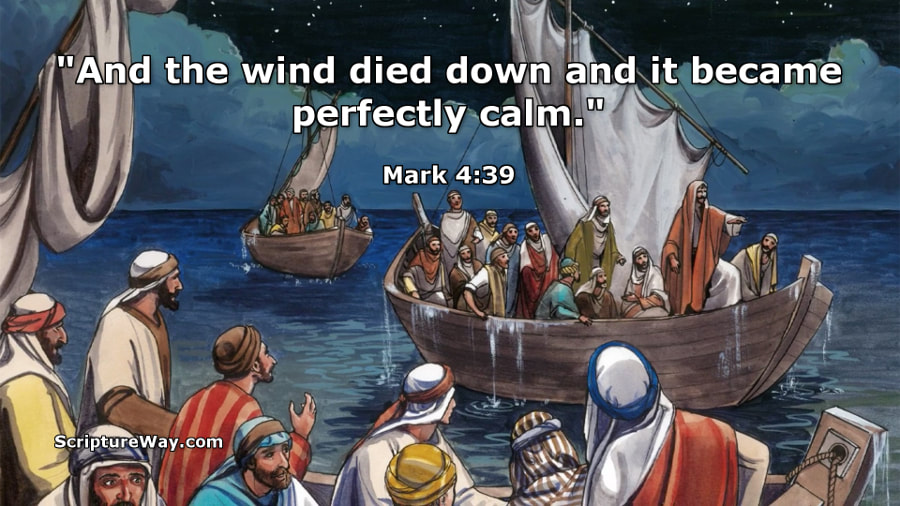 Jesus Calms the Storm - Mark 4:39 - Used by permission - Good News Productions International and College Press Publishing Jesus Calms the Storm - Mark 4:39 - Used by permission - Good News Productions International and College Press Publishing
"And He got up and rebuked the wind and said to the sea, 'Hush, be still.' And the wind died down and it became perfectly calm" (Mark 4:39).
Jesus -- the Creator (Genesis 1:1, John 1:1-3, Colossians 1:15-17) -- demonstrated his authority over the creation by commanding the sea to be still (Mark 4:35-41). This miracle powerfully showed Jesus' disciples who he was (and still is). The Old Testament teaches that God is the only one who can still the roaring sea (Psalm 65:5-7). Jesus' disciples remarked, "Who then is this, that even the wind and the sea obey Him?" (Mark 4:41). 7. Jesus' Authority to Execute Judgment
"For just as the Father has life in Himself, even so He gave to the Son also to have life in Himself; and He gave Him authority to execute judgment, because He is the Son of Man" (John 5:26-27).
God has given Jesus -- the Son of God (Luke 1:31-35), the Son of Man (Daniel 7:13-14), and the Messiah (John 4:25-26) -- authority to execute judgment. The Greek word for "judgment" in John 5:27 is krisis (pronounced kree'-sis). Krisis means a judicial decision with the results of either a positive verdict for (righteousness) or a negative verdict against (condemnation) (HELPS Word-studies - Ref. 7). The Gospel of John tells us that those who do not believe in Jesus are "judged already" (John 3:18, for context, read John 3:16-21). Those who do believe in Jesus do not need to worry about judgment [condemnation] because "He who hears My word, and believes Him who sent Me, has eternal life, and does not come into judgment, but has passed out of death into life" (John 5:24). 8. Jesus' Authority over Mankind to Give Eternal Life
"Jesus spoke these things; and raising His eyes to heaven, He said, 'Father, the hour has come; glorify Your Son, so that the Son may glorify You, just as You gave Him authority over all mankind, so that to all whom You have given Him, He may give eternal life" (John 17:1-2 NASB 2020).
Note the distinction Jesus makes in this prayer between "all mankind" and those "given him." Although Jesus has authority over all mankind, Jesus gives eternal life to those his heavenly Father has given him, that is, all who will believe in him (John 3:14-16, 1 John 5:13, Ref. 8). 9. Jesus Gives Authority to His Disciples
"And He called the twelve together, and gave them power and authority over all the demons and to heal diseases. And He sent them out to proclaim the kingdom of God and to perform healing" (Luke 9:1-2).
Twelve sent out: Jesus not only gave the twelve disciples the authority to act, but also gave them the power to act. The power and authority that Jesus gave his disciples over demons and to perform healing confirmed their preaching message. Luke 9:6 tells us, "Departing, they began going throughout the villages, preaching the gospel and healing everywhere."
Seventy sent out: Luke 10:1 tells us that Jesus appointed seventy others and sent them to every city and place where He was going to come. Jesus instructed the seventy to heal the sick and say to them, "The kingdom of God has come near to you" (Luke 10:9). The seventy returned with joy, saying, "Lord, even the demons are subject to us in Your name" (Luke 10:17). The authority of Jesus' disciples to heal the sick, to cast out demons, to preach the gospel, and to make disciples is not in the authority of their (our) own name but is in the authority of the name of Jesus.
Disciples after Pentecost: At Pentecost and after Pentecost, God poured out the Holy Spirit on Jesus' disciples and filled them (Acts 2:1-4, Acts 2:17, Acts 4:31, Acts 10:44-48). Jesus had told them in advance that the Holy Spirit would come upon them so they would be his witnesses "in Jerusalem, Judea, Samaria, and even the remotest part of the earth" (Acts 1:8). In the authority of Jesus' name, Jesus' spirit-filled disciples healed the sick, cast out demons, and raised the dead. These miracles resulted in opportunities for Jesus' disciples to testify about Jesus Christ with the results of many people believing in the Lord. Examples include:
10. All Authority Has Been Given to Jesus
After Jesus' resurrection, "The eleven disciples proceeded to Galilee, to the mountain which Jesus had designated" (Matthew 28:16). "Jesus came up and spoke to them, saying, 'All authority has been given to Me in heaven and on earth'" (Matthew 28:18).
God has exalted Jesus Christ and has given him supreme authority in heaven and earth. The Apostle Paul tells us about Jesus, "Being found in appearance as a man, He humbled Himself by becoming obedient to the point of death, even death on a cross. For this reason also, God highly exalted Him, and bestowed on Him the name which is above every name, so that at the name of Jesus every knee will bow, of those who are in heaven and on earth and under the earth, and that every tongue will confess that Jesus Christ is Lord, to the glory of God the Father" (Philippians 2:8-11). God has given Jesus all authority over all peoples and nations (Daniel 7:13-14, Philippians 2:10-11). Jesus governs and protects the church (Ephesians 1:19-23). Jesus bestows the Holy Spirit (John 14:16-17, Acts 1:8), and he employs the angels of God to render service for those who will inherit salvation (Hebrews 1:13-14, Ref. 10). In the supreme authority that God has given Jesus Christ, Jesus said to his disciples then, and he says to us -- his disciples today -- "Go therefore and make disciples of all the nations, baptizing them in the name of the Father and the Son and the Holy Spirit, teaching them to observe all that I commanded you; and lo, I am with you always, even to the end of the age" (Matthew 28:19-20).
Apply. In the authority that Jesus has given you as his disciple, how will you serve others in Jesus' name?
References
1. https://www.biblegateway.com/passage/?search=Matthew+28%3A18&version=NASB1995 2. https://biblehub.com/greek/1849.htm 3. https://biblehub.com/greek/1605.htm 4. https://biblehub.com/commentaries/gill/mark/1.htm Gills Exposition - Mark 1:22 5. https://en.wikipedia.org/wiki/Hillel_the_Elder 6. https://biblehub.com/commentaries/cambridge/mark/1.htm Cambridge Bible for Schools and Colleges - Mark 1:22 7. https://biblehub.com/greek/2920.htm 8. https://biblehub.com/commentaries/barnes/john/17.htm Barnes notes on John 17:2 9. https://www.merriam-webster.com/dictionary/divination 10. https://biblehub.com/commentaries/pulpit/matthew/28.htm Pulpit Commentary on Matthew 28:18
This article presents five Biblical keys to effective prayer -- pray with other Christians, pray in faith, confess your sin, pray according to the will of God, and pray in the name of Jesus. This article also discusses the results of effective prayer.
Introduction
Prayer is one of the most important topics we will ever discuss as Christians. Prayer is communication with God. Prayer helps us receive God's peace and healing in the midst of our problems and concerns. Prayer helps us discern God's will for our lives. Prayer encourages others, protects others, and empowers others to further the ministry of Christ in the world.
It is to our advantage to learn to pray effectively. Why? Because "The effective prayer of a righteous man can accomplish much" (James 5:16). The Bible gives us guidance in how to pray effectively. Keys to Effective Prayer1. Pray with other Christians
James 5:14 instructs us, "Is anyone among you sick? Then he must call for the elders of the church and they [third person plural] are to pray over him, anointing him with oil in the name of the Lord" (James 5:14, brackets added).
Of course, God hears our prayers when we are alone and are praying in secret (Matthew 6:5-6). However, Scripture also teaches us that it is advantageous for us to pray with our companions in Christ. Recall that Jesus sent out his disciples in pairs (Mark 6:7). He gave them [third person plural] authority over unclean spirits, with the results that they cast out many demons, anointed sick people with oil, and healed them (Mark 6:13). 2. Pray in faith
James 5:15 tells us, "And the prayer offered in faith [Greek word pistis, which means persuasion, come to trust] will restore the one who is sick, and the Lord will raise him up, and if he has committed sins, they will be forgiven him" (James 5:15, brackets added, Ref. 1). When we pray in faith, God is pleased because we believe that "He is" and that "He is a rewarder of those who seek Him" (Hebrews 11:6). Note that faith, "divine persuasion," is a gift that God gives to believers (Ephesians 2:8-9, Ref. 1, Acts 16:14).
3. Confess your sin and receive forgiveness
This teaching -- that confession of sin is a prerequisite for effective prayer -- may seem strange to some, even Christians. However, this key cannot be overlooked if we are to pray effectively.
John writes about confessing our sins to God, "If we confess our sins, He is faithful and righteous to forgive us our sins and to cleanse us from all unrighteousness" (1 John 1:9). When we harbor unforgiven sin, or anger or unforgiveness towards others, that sin can block the channel of God's power through us in our prayers. Refer to Matthew 5:22-24, Matthew 6:14-15, James 1:20, and Psalm 66:18. To become effective prayer channels for God when we minister to others or pray for ourselves, we should first take time to confess our sins and to receive God's forgiveness through God's Son, Jesus Christ (1 John 1:7, 9). 4. Pray confidently according to the will of God
John tells us, "This is the confidence [bold resolve] which we have before Him, that, if we ask anything according to His will [God's desire, preferred will], He hears us" (1 John 5:14, brackets added, Ref. 2, Ref. 3).
Praying in God's will includes trusting God with the outcome. Recall that Jesus said to his Father, "Not My will, but Yours be done" (Luke 22:42). As believers in Christ and as children of our heavenly Father (John 1:12), we can learn God's will through prayer (speaking with and listening to God), God's word, and the guidance of the Holy Spirit (John 16:13). If we do not know God's will in a matter, we should ask him (James 1:5). 5. Pray in the name (character and authority) of Jesus
Jesus said to his disciples (and by extension to us as believers), "Whatever you ask in My name, that will I do, so that the Father may be glorified in the Son. (14) If you ask Me anything in My name, I will do it" (John 14:13-14).
When we pray in Jesus' name, we pray representing his character, reputation, and authority. We pray representing Christ, not ourselves (Ref. 4). Praying in Jesus' name should not be just a religious phrase we tack on at the end of our prayers. We should discern God's will and then pray our entire prayer in Jesus' name -- in his behalf and for his glory. The Results of Effective Prayer
Before we close this lesson, let's gain further insight by looking at two word definitions in James 5:16. The New American Standard Bible (1995) says, "The effective prayer of a righteous man can accomplish much" (James 5:16, NASB1995).
In James 5:16 the Greek word for effective in "effective prayer" is the verb energeó. Energeó means energizing, working, and displaying activity (Ref. 5). HELPS Word-studies illustrates this term by the example of "an electrical current energizing a wire, bringing it to a shining light bulb" (Ref. 5). Like the wire that brings electrical energy to turn on a light bulb, our effective prayers are channels for God's energy and power to work change in situations for others. The James 5:16 scripture also tells us our effective prayers can accomplish much. The Greek word translated as can accomplish much is ischuó. Ischuó means to prevail, to engage the resistance with combative, confrontive force to achieve what the Lord gives us faith to achieve (Ref. 6). Our effective prayers engage the resistance. Finally, a word about trusting God. Many times when we pray fervently for others we will see improvements including peace and healing. However, sometimes when we pray in faith and apply all the keys in prayer that God has given to us, the results may not come quickly or turn out the way we hope. In those situations we must continue to trust God. God helps us through all of life's difficulties, and for believers in Jesus Christ, God will ultimately bring us into his presence in heaven.
"Blessed is the one whose transgression is forgiven, whose sin is covered. Blessed is the man against whom the Lord counts no iniquity, and in whose spirit there is no deceit." (Psalm 32:1-2)
"Pardoning mercy is of all things in the world most to be prized, for it is the only and sure way to happiness." -- Treasury of David (Ref. 1)
This article teaches the seriousness of transgression, sin, and iniquity from Psalm 32:1-2 as well as the blessedness of forgiveness through the atonement of Christ.
Consider. True happiness comes not from the world, nor through "self help," but from God's forgiveness of our sins through the atonement of Christ.
The Blessedness of Forgiveness
Psalm 32:1 begins with an exclamation in the form of an interjection. The opening phrase could be translated "Oh! How blessed is the one whose transgression is forgiven!" (Ref. 2) The Hebrew word for blessed is esher, which is a forceful interjection that means "How happy!" (Ref. 3) David is so joyful that he repeats the exclamation, "Oh! How blessed," again in verse 2. "Blessed is the man against whom the Lord counts no iniquity, and in whose spirit there is no deceit" (Psalm 32:2). Note that true happiness of forgiveness comes from God, not from man.
The word for "man" in Psalm 32:2 is adam, which means mankind, including men, women, and children (Ref. 4). The Threefold Picture of Sin
Psalm 32:1-2 employs three words for sin -- "transgression," "sin," and "iniquity." All three are serious. These words describe the compass of sin and its foulness (Ref. 2). Let's take them in the order described by David, the psalmist.
Transgression defined
Psalm 32:1 says "Blessed is the one whose transgression is forgiven." The Hebrew word for transgression means rebellion (Ref. 5). We commit a transgression against God when we know, or our conscience knows, what God's law teaches, and we go ahead and do the deed anyway.
Sin defined
The Hebrew word for sin written in Psalm 32:1, chataah, means great sin. Chataah occurs only eight times in the Old Testament (Ref. 6, Genesis 20:1-9; Exodus 32:1-4, 19-21).
A similar Hebrew word for sin, chata, occurs more than 200 times in the Old Testament and means do wrong, commit a mistake, or miss the mark or goal (Strong's Exhaustive Concordance Ref. 7, Exodus 20:18-20, Psalm 4:4). Iniquity defined
The Hebrew word for iniquity is avon, which means moral evil (Ref. 8). "'Iniquity' is defined as being wicked or immoral in nature or character. Primarily, it indicates 'not an action, but the character of an action,' and is so distinguished from 'sin'" (Ref. 9). We commit iniquity when we not only rebel against God and miss the mark, but also waver or diverge from the straight path manifest in God's law (Ref. 2).
The Threefold Picture of Forgiveness
Psalm 32 verses one and two describe three aspects of forgiveness - "forgiven," "covered," and "not counted (not imputed)." Let's take each aspect in the order presented.
Forgiveness defined
Psalm 32:1 begins, "Blessed is the one whose transgression is forgiven ..." When God forgives our sins, he lifts them up and carries them away. The Hebrew word for forgiven means to lift, carry away, and bear (Ref. 10).
In the Old Testament, on the annual day of atonement, the scapegoat (literally, goat of removal) carried away the sins of the people into the wilderness (Leviticus 16:7-10, Leviticus 16:29-30, Ref. 11). In the New Testament, Jesus Christ, the Lamb of God, is the one who takes away our sin (John 1:29). Jesus Christ takes away our sin not just annually but once and for all time (Hebrews 9:11-12). "He himself bore our sins in his body on the cross, so that we might die to sins and live for righteousness; by his wounds you have been healed" (1 Peter 2:24). Sin covered
"Blessed is the one whose transgression is forgiven, whose sin is covered" (Psalm 32:1, italics added). The Hebrew word for cover means to hide or conceal (Ref. 12). For the believer in Christ, God hides our sin, covers it with a merciful veil, so it no longer comes into his view as evidence against us (Ref. 2). Christ's atonement is the covering for our sin (Ref. 2).
Iniquity not imputed
Psalm 32 verse 2 in the English Standard Version (ESV) begins, "Blessed is the man against whom the Lord counts no iniquity ..." The Hebrew word for count means impute, charge, or reckon (Ref. 13). Even though our iniquity (moral evil) has been ugly, when we believe in and trust our Lord and Savior Jesus Christ, he does not impute to us (charge us for, take into account, or reckon) that iniquity (Ref. 13).
How Do We Receive the Blessedness of Forgiveness?The blessedness of forgiveness can be known only through the atonement of Christ
Isaiah 53:5 - "But he was pierced for our transgressions; he was crushed for our iniquities; upon him was the chastisement that brought us peace, and with his wounds we are healed."
1 Peter 1:18-19 - "... knowing that you were ransomed from the futile ways inherited from your forefathers, not with perishable things such as silver or gold, but with the precious blood of Christ, like that of a lamb without blemish or spot." 1 John 2:2 - "He is the atoning sacrifice for our sins, and not only for ours but also for the sins of the whole world." We receive forgiveness by acknowledging our sin and confessing our sin to God
Psalm 32:5 - "I acknowledged my sin to You, And my iniquity I have not hidden. I said, 'I will confess my transgressions to the Lord,' And You forgave the iniquity of my sin."
1 John 1:8-9 - "If we say that we have no sin, we deceive ourselves, and the truth is not in us. If we confess our sins, He is faithful and just to forgive us our sins and to cleanse us from all unrighteousness." True happiness (blessedness) comes only through the forgiveness and removal of our sin by Christ, not from anything the world provides.
Apply. Do you want to receive the blessedness of forgiveness for your sins? Acknowledge your sins, and confess your sins to Jesus Christ (1 John 1:9). He will lift away the guilt and pain of your sin and will heal you. You will receive the true happiness of knowing by faith that you are pardoned forever by Christ.
References
1. https://biblehub.com/commentaries/tod/psalms/32.htm 2. https://biblehub.com/commentaries/maclaren/psalms/32.htm 3. https://biblehub.com/hebrew/835.htm 4. https://biblehub.com/hebrew/120.htm 5. https://biblehub.com/hebrew/6588.htm 6. https://biblehub.com/hebrew/2401.htm 7. https://biblehub.com/hebrew/2398.htm 8. https://biblehub.com/hebrew/5771.htm 9. https://www.christianity.com/wiki/sin/what-is-iniquity-meaning-and-importance-in-the-bible.html 10. https://biblehub.com/hebrew/5375.htm 11. https://biblehub.com/hebrew/5799.htm 12. https://biblehub.com/hebrew/3680.htm 13. https://biblehub.com/hebrew/2803.htm
"Now the tax collectors and sinners were all drawing near to hear him. 2 And the Pharisees and the scribes grumbled, saying, 'This man receives sinners and eats with them.'" (Luke 15:1-2)
God draws people who are sinners to seek Jesus. Jesus actively looks for, expectantly waits for, and warmly receives sinners.
Definitions -- Who were these people in Luke 15:1-2?1. Tax Collectors
Tax collectors were people who collected various taxes for the Romans who occupied Palestine. They often charged much more than they should to make themselves rich (Ref. 1). The Jewish people despised the tax collectors and considered any Jew a traitor who was a tax collector for the Romans. Jesus called Matthew (Levi), a tax collector, to be his disciple (Matthew 9:9, Mark 2:14, Luke 5:27-28).
2. Sinners
The synoptic gospel writers often lumped together "tax collectors" and "sinners" (Matthew 9:10-11, Mark 2:15-16, Luke 5:30, Luke 15:1). The Pharisees shunned both tax collectors and people that the Pharisees deemed "sinners," including:
a. People who lived blatantly in contradiction to the law - such as murderers, robbers, and prostitutes (Luke 7:37, Matthew 21:31, Ref. 2 below). b. "The people of the land" (am ha-aretz) who did not observe the Pharisees' strict interpretation of the law (Matthew 23:1-5, Ref. 3). This category included almost everybody, so many "sinners" were in the daily company of Jesus (Matthew 11:18-19, Mark 2:15, Luke 15:1, Ref. 2, Ref. 3). Technically, the Greek word for sinners, hamartólos, means falling short of what God approves, i.e. what is "wide of the mark"; a blatant sinner (Ref. 4). 3. Pharisees
The Pharisees were a Jewish religious sect. "Pharisee" is derived from the Aramaic term, peras ("to divide and separate"). Hence, a Pharisee was someone "separated from sin" (Ref. 5). The Pharisees separated themselves from the great mass of the populace—the "people of the land" (am ha-aretz)—by their "strict adherence to the minutia of their legal tradition" (Ref. 6).
The Pharisees believed the deception that they earned merit before God based on religious works (Luke 18:10-13, Ref. 6). In contrast, true believers in Christ recognize "For by grace you have been saved through faith. And this is not your own doing; it is the gift of God, not a result of works, so that no one may boast" (Ephesians 2:8-9). The Pharisees appeared in the gospels as the chief antagonists of Jesus (Matthew 19:3, Matthew 22:15, Mark 8:11-12, Ref. 6). The Pharisees largely were members of the middle class—businessmen, merchants, and tradesmen of their day (Ref. 6). In legal matters, the Pharisees had recourse to the professionals in the law, the scribes (described below). 4. Scribes
The scribes were educated teachers and authorities in the Mosaic law (Ref. 7). In Jesus' day, the scribes were legal professionals who drafted documents such as contracts for marriage, loans, or sale of land (Ref. 8). The scribes questioned Jesus' authority, "By what authority are you doing these things, or who gave you this authority to do them?" (Mark 11:28). The scribes participated with the Pharisees in criticizing Jesus and his disciples (Mark 7:5-8). Jesus pronounced multiple woes against the practices of the scribes and Pharisees (interesting reading, Matthew 23:13-36).
What are the main principles in Luke 15:1-2?1. God draws sinners to Jesus
Luke 15:1 is remarkable because not only does Jesus seek people who are lost (Luke 19:10), but also that God draws people who are sinners to seek Jesus. Luke, the gospel writer, says, "Now the tax collectors and sinners were all drawing near to hear him" (Luke 15:1).
At the time of the event that Luke describes in Luke 15:1-2, Jesus was in the last months of his earthly ministry (Ref. 9 below). Many people whom the Pharisees shunned as sinners recognized their need for Jesus and came to him. These were people through home and family associations or through their occupations or immoral living were looked upon with disfavor by the Pharisees and scribes. Often they were indifferent or had little to do with their more religious and orthodox countrymen. The religious people, Pharisees in heart, despised them and looked on them as hopelessly lost (Ref. 10). No one spoke to these people like Jesus. To these people who were "outside of the synagogues" of their time Jesus brought hope. Jesus spoke to them with tenderness. Sinners came to Jesus as their Great Physician to find healing for their spiritual, emotional, and physical ailments. Jesus did not overlook their sin, but called these people to repentance (Luke 5:29-32, Mark 1:14-15). 2. Jesus warmly receives sinners - then and now
Luke 15:2 tells us, "And the Pharisees and the scribes grumbled, saying, 'This man receives sinners and eats with them.'" The Pharisees, the religious establishment of Jesus' day, were indignant that Jesus associated with people outside the synagogue community who did not keep the rules the Pharisees believed necessary for merit with God. In contrast, Jesus deliberately showed people the true nature of God. He reached out in kindness to people outside the religious establishment. He treated them with tenderness, and he called them to repentance and faith in God who loves them. Jesus does the same today.
The Pharisees accused Jesus of receiving sinners. That was (and is) a true accusation. Jesus does receive sinners - then and now. The Greek work for receive means actively look for, expectantly wait, and warmly receive (Ref. 11). Jesus is like the excellent example of the father in the parable of the Prodigal Son (Luke 15:11-32). The father expectantly waited for his son to return to him. When the prodigal son returned, the son repented of his sin, and the father received him with great joy. Jesus expectantly waits to receive you.
Apply. Come to Jesus. He will warmly receive you. He will heal you of your spiritual, emotional, and physical sickness. Jesus will forgive your sin and will cleanse you from all unrighteousness (1 John 1:9).
References
1. http://www.freebibleimages.org/photos/lumo-jesus-matthew/ (refer to "Story Planner") 2. A Theological Word Book of the Bible, Alan Richardson, Editor, MacMillan Publishing Company, 1978 3. https://en.wikipedia.org/wiki/Am_ha%27aretz 4. https://biblehub.com/greek/268.htm 5. https://biblehub.com/greek/5330.htm 6. https://www.biblegateway.com/resources/encyclopedia-of-the-bible/Pharisees 7. https://biblehub.com/greek/1122.htm 8. https://www.britannica.com/biography/Jesus/Scribes-and-Pharisees 9. Key to the Tree of Jesus' Life and Harmony of the Gospels, The Thompson Chain-Reference Bible, Fourth Improved Edition, B. B. Kirkbridge Bible Company, Inc., 1964 10. https://biblehub.com/commentaries/pulpit/luke/15.htm 11. https://biblehub.com/greek/4327.htm
"Come now, let us reason together, says the Lord: though your sins are like scarlet, they shall be as white as snow; though they are red like crimson, they shall become like wool." (Isaiah 1:18)
This lesson is the first in a series on the "Comes" of God's word. This lesson describes God's invitation in Isaiah 1:18, "Come now, let us reason together, says the Lord: though your sins are like scarlet, they shall be as white as snow."
Consider. In Isaiah 1:18-20 (Old Testament), God's forgiveness was conditional on the people's obedience to God. How do people today receive God's forgiveness now that Christ has paid the penalty for sin?
Introduction
Being accused of having hands full of blood was a serious accusation. Yet, that is exactly how the Lord accused the people of Judah and Jerusalem (Isaiah 1:1) in Isaiah 1:15, "Even though you make many prayers, I will not listen; your hands are full of blood." Having hands full of blood is a symbol for the cruel wrongs the people had committed including the guilt of actual murder (Isaiah 1:21, Ref. 1). Isaiah had already spoken against the people for their rebellion against God (Isaiah 1:2) and for the insincerity of their sacrifices, offerings, festivals, and prayers (Isaiah 1:11-15).
Come Now
In Isaiah 1:18, God says "Come now." The Hebrew word for come is halak, which means to go, come, walk (Ref. 2). Here in Isaiah 1:18 "Come" is a summons for the recipient of the message to approach the speaker (God). Although God does not force the people of Judah and Jerusalem to come to him, God strongly urges the people to come to him that they might receive his pardon. Likewise, today God strongly urges all sinners to come to him.
Let Us Reason Together
The Hebrew word for let us reason together, yakach, means to decide, adjudge, prove, and argue (Ref. 3, Job 13:15). The idea is that of a legal process in which each party maintains his own case (Ref. 4, Isaiah 43:26). God proposes to present to the people of Judah and Jerusalem the principles on which he is willing to forgive their sins and bestow his pardon (Ref. 5). God describes the terms for pardon in Isaiah 1:18-20.
Though Your Sins Are Like Scarlet The Crimson or Scarlet Worm (Ref. 7) The Crimson or Scarlet Worm (Ref. 7)
The stain of the people's sins are bright red and indelible like the scarlet dye used by the ancients. The ancients made scarlet and crimson dyes from the dried bodies of the insect (worm), Coccus ilicis found on oak trees in Spain and in the countries east of the Mediterranean (Ref. 5, Ref. 6, Ref. 7).
When it was time for the female Coccus ilicis to give birth, she would attach herself permanently to an oak tree. Her body protected her eggs until the larvae were hatched and able to live on their own. As the mother died, she oozed a crimson fluid which stained her body and the surrounding wood. The death of the female Coccus ilicis paints a picture of the death of Christ who sacrificed his blood on the wood of the cross that others, by believing in him, may live (Ref. 7, Ref. 8).
The scarlet dye was indelible. Cotton material was dipped in this color twice so the stain was permanent (Ref. 5). The stain of the red dye (and likewise the stain of sin in the human heart) could not be washed away by man alone. That is why we as sinners need God's action to wash us clean.
The scarlet dye was known since early in the Old Testament times, centuries before the prophet Isaiah. For further study, I suggest you check these additional references for scarlet in the Bible:
They Will Be White as Snow
Only God can forgive sin. Only God can cleanse people and wash away their sin. David recognized this principle. He prayed to God, "Have mercy on me, O God, according to your steadfast love; according to your abundant mercy blot out my transgressions. Wash me thoroughly from my iniquity, and cleanse me from my sin!" (Psalm 51:1-2). David also wrote, "Wash me, and I shall be whiter than snow" (Psalm 51:7). White symbolizes innocence and purity (Ref. 9). "White as snow " is "a powerful figurative description of the result of forgiveness" (Ref. 10 below).
Though They Are Red Like Crimson, They Shall Be as Wool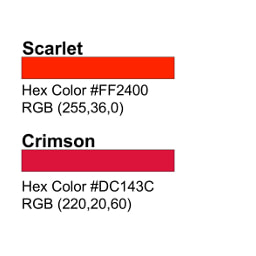 Scarlet and Crimson Colors (Ref. 11) Scarlet and Crimson Colors (Ref. 11)
Scarlet and crimson are similar reddish colors. Scarlet is bright red with an orange tint. Crimson is a strong, bright, deep red color combined with some blue or violet, resulting in a small degree of purple (Ref. 11). Crimson is associated with the stain of blood (Isaiah 1:15, Ref. 12). The ancients employed crimson color to dye wool (Ref. 5).
The Hebrew word for red in the phrase "red like Crimson" is adom, which means glaring, flagrant in Isaiah 1:18 (Brown-Driver-Briggs, Ref. 13). Though their sins are flagrant and appear as deep stains, God, upon their repentance and reformation, will remove their sins so they will be like wool restored to its original, undyed whiteness (Ref. 14). Forgiveness - By Obedience or by Faith?
In the Old Testament, God's relationship with man was based on obedience to God. Isaiah confirms this point in regard to God's forgiveness. In Isaiah 1:18 God offers forgiveness and cleansing to the people of Judah and Jerusalem. However, God's forgiveness and cleansing was conditional based on their willingness to obey God. Isaiah 1:19-20 describes the conditions for God's forgiveness, and the consequences for not obeying God. "If you are willing and obedient, you shall eat the good of the land; but if you refuse and rebel, you shall be eaten by the sword; for the mouth of the Lord has spoken" (Isaiah 1:19-20, italics added). For further study on God's relationship with man in the Old Testament based on obedience, I suggest reading Deuteronomy 30:15-20.
In the New Testament, God's relationship with man is based on faith in Christ. The Apostle Paul writes, "For by grace you have been saved through faith. And this is not your own doing; it is the gift of God" (Ephesians 2:8). Faith in Christ means believing in, trusting in, and having confidence in Christ (Ref. 15). Peter preached to the Gentiles gathered in Cornelius' house that through the name of Jesus everyone who believes in him receives forgiveness of sins (Acts 10:34-43). God's power to cleanse our sins "white as snow" is through the blood of Christ (1 John 1:7). Summary - Main Principles
Let's review the main principles in this lesson:
1. God invites all sinners to come to him that we might receive his pardon (Isaiah 1:18). 2. The stain of sin is red as scarlet (Isaiah 1:18). 3. Only God can wash our sins white as snow (Isaiah 1:18, Psalm 51:7). As a result of Christ's death, we know that it is the blood of Jesus that cleanses us from all sin (1 John 1:7). 4. In the Old Testament, God's forgiveness was conditional on the people's obedience to God (Isaiah 1:18-20). In the New Testament, God provides forgiveness and cleansing through faith in Christ (Ephesians 2:8, Acts 10:43).
Apply. If you do not know Christ, come to him, confess your sin, and ask him to forgive you. Put your faith and trust in him and walk in the cleansed life that Christ has given you. If you do have faith in Christ as your Savior, walk with him in the light. Thank him for forgiving your sin and for cleansing you from all unrighteousness (1 John 1:7-9).
Related Lessons
"God's Great Invitation - Come, Satisfy Your Thirst" (Isaiah 55:1) "Jesus' Invitation - Come to Me and Rest" (Matthew 11:28-30)
References
1. https://biblehub.com/commentaries/cambridge/isaiah/1.htm Cambridge Bible for Schools and Colleges - Isaiah 1:15 2. https://biblehub.com/hebrew/1980.htm 3. https://biblehub.com/hebrew/3198.htm 4. https://biblehub.com/commentaries/cambridge/isaiah/1.htm Cambridge Bible for Schools and Colleges - Isaiah 1:18 5. https://biblehub.com/commentaries/barnes/isaiah/1.htm Barnes' Notes on the Bible - Isaiah 1:18 6. https://www.biblegateway.com/resources/encyclopedia-of-the-bible/Scarlet 7. https://www.discovercreation.org/blog/2011/11/20/the-crimson-or-scarlet-worm/ 8. https://studybible.info/strongs/H8438 9. https://www.biblegateway.com/resources/encyclopedia-of-the-bible/White 10. The NIV Study Bible, Zondervan Bible Publishers, 1985, note on Isaiah 1:18 11. https://en.wikipedia.org/wiki/Shades_of_red 12. https://biblehub.com/commentaries/ellicott/isaiah/1.htm Ellicott's Commentary for English Readers - Isaiah 1:18 13. https://biblehub.com/hebrew/119.htm 14. https://biblehub.com/commentaries/jfb/isaiah/1.htm Jamieson-Fausset-Brown Bible Commentary - Isaiah 1:18 15. https://biblehub.com/greek/4102.htm
"For the word of the cross is foolishness to those who are perishing, but to us who are being saved it is the power of God." (1 Corinthians 1:18)
"Those who receive the gospel, and are enlightened by the Spirit of God, see more of God's wisdom and power in the doctrine of Christ crucified, than in all his other works." -- Matthew Henry (1662-1714) (Ref. 1, Ref. 2)
This lesson describes what the Apostle Paul meant by the phrase, "the word of the cross." God loves us so much that Jesus Christ died on the cross for us, and purchased the forgiveness of our sins. We will also study why for some people, the word of the cross is foolishness and for others, it is the power of God.
Consider. When the Apostle Paul wrote the phrase, "the word of the cross" (1 Corinthians 1:18), what did he mean? In your own words, how would you explain "the word of the cross" to someone else?
Definition of "word." The Greek word for word in 1 Corinthians 1:18 is logos. Logos means something said, a message, reasoning expressed by words, and instruction (Ref. 3). Acts 13:26 and 2 Corinthians 5:19 provide examples where logos is translated as message.
Definition of "cross." The Greek word for cross is staurós. Staurós has both a literal meaning and a figurative meaning. Christ was crucified on a literal Roman cross (Ref. 4). According to HELPS Word-Studies, "Staurós was the crosspiece of a Roman cross; the cross-beam was placed at the top of the vertical member to form a capital 'T' (Ref. 4). "This transverse beam was the one carried by the criminal" (Ref. 4, Matthew 27:31-32, John 19:17). In addition to the shape of a capital "T," researchers also discuss the cross in the shape of a cruciform ("†" or "✚") and as a vertical stake (Ref. 5). Most Christian denominations present the Christian cross in the shape of a cruciform (Ref. 5, Ref. 6).
Staurós also has a figurative meaning. Jesus spoke about the cross each believer bears to be his true follower (Ref. 4, Matthew 10:38, Mark 8:34, Luke 9:23). Thayer's Greek Lexicon describes the figurative cross as an expression used by "those who, on behalf of God's cause, do not hesitate cheerfully and manfully [courageously] to bear persecutions, troubles, distresses — thus recalling the fate of Christ and the spirit in which he encountered it" (Ref. 4, brackets added). What is meant by the expression, "the word of the cross"?
The word, or message, of the cross is that God loves us so much that his Son, Jesus Christ, was crucified and died on the cross for us. Through his sacrifice, Jesus Christ has purchased the forgiveness of our sins. Through Jesus Christ, those who believe in him receive salvation and eternal life.
"But God demonstrates His own love toward us, in that while we were yet sinners, Christ died for us" (Romans 5:8). "For God so loved the world, that He gave His only begotten Son, that whoever believes in Him shall not perish, but have eternal life" (John 3:16). Foolishness to those who are perishing
The Greek word for foolishness is mória. Mória means folly, absurdity, foolishness (Ref. 7). The Greek word for perish is apollumi which means destroy utterly (Ref. 8). HELPS Word-Studies further defines apollumi as "to die, with the implication of ruin and destruction" (Ref. 8).
Why would Paul write that the message of the cross "is foolishness to those who are perishing" in 1 Corinthians 1:18? 1. "To the Jews 'the cross' was the tree of shame and horror; and a crucified person was 'accursed of God' " (Ref. 9, Deuteronomy 21:23). To the Jews, the thought of "a crucified Messiah" seemed "a revolting folly" (Ref. 9). 2. To Paul's Greek audience, the cross was the punishment for slaves and murderers (Ref. 9). The cross meant shame and agony. To the Greeks, worshiping "a crucified malefactor" was superstitious (Ref. 9). 3. Paul explains, "But a natural man does not accept the things of the Spirit of God, for they are foolishness to him; and he cannot understand them, because they are spiritually appraised" (1 Corinthians 2:14). The natural man, who is "not truly enlightened and renewed by the Word and Spirit of God, and therefore has no other way of obtaining knowledge but by his senses and natural understanding … does not understand or apprehend the things of the Spirit of God" (Ref. 10). To us who are being saved it is the power of God
The Greek word for saved is sózó, which means rescued from destruction and brought into divine safety (Ref. 11). The Greek word for power in 1 Corinthians 1:18 is dunamis. Dunamis means (miraculous) power, might, strength (Ref. 12).
The cross is much more than a decoration. "The cross is God's saving power" (Expositor's Greek Testament, Ref. 13). For us who are being saved, the cross is the means by which Jesus has forgiven our sins and rescued us from the path of destruction. By the cross, God offers us the gift of eternal life when we believe in Jesus Christ, God's Son. When we share the "word of the cross" with others, we share not a fable but God's mighty plan for saving people. "For I am not ashamed of the gospel, for it is the power of God for salvation to everyone who believes, to the Jew first and also to the Greek" (Romans 1:16).
Apply. God gives us only two choices. Either we are on the path of perishing or we are on the path of salvation. On which path are you? If you do not know Christ, put your faith in him today, and receive from him forgiveness of your sins and the gift of eternal life. If you do know Christ, thank him for his sacrificial death on the cross to forgive your sins, and for his power working in you each day.
References
1. https://biblehub.com/commentaries/mhc/1_corinthians/1.htm 2. https://en.wikipedia.org/wiki/Matthew_Henry 3. https://biblehub.com/greek/3056.htm 4. https://biblehub.com/greek/4716.htm 5. (Ref. 5 begins on the next line) https://en.wikipedia.org/wiki/Instrument_of_Jesus%27_crucifixion 6. https://en.wikipedia.org/wiki/Christian_cross 7. https://biblehub.com/greek/3472.htm 8. https://biblehub.com/greek/622.htm 9. https://biblehub.com/commentaries/pulpit/1_corinthians/1.htm 10. https://biblehub.com/commentaries/benson/1_corinthians/2.htm 11. https://biblehub.com/greek/4982.htm 12. https://biblehub.com/greek/1411.htm 13. https://biblehub.com/commentaries/egt/1_corinthians/1.htm |
Daily Bible Verse
(Click the link above) Author
Mr. Whitney V. Myers. Christian. For more information, please visit the Author Page. Posting ScheduleI plan to provide new postings about once a month. Planned Topics(subject to change) Recent Posts(most recent three months) Popular Posts(top 10) Categories
All
Archives
March 2024
|
|
Copyright 2018-2024 Whitney V. Myers |
Listed in Feedspot's Top 100 Bible Study Blogs and Websites |
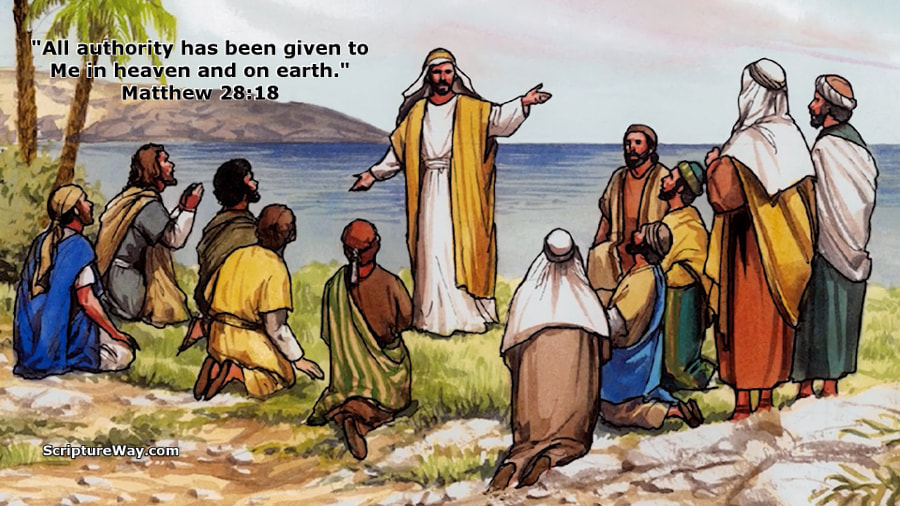


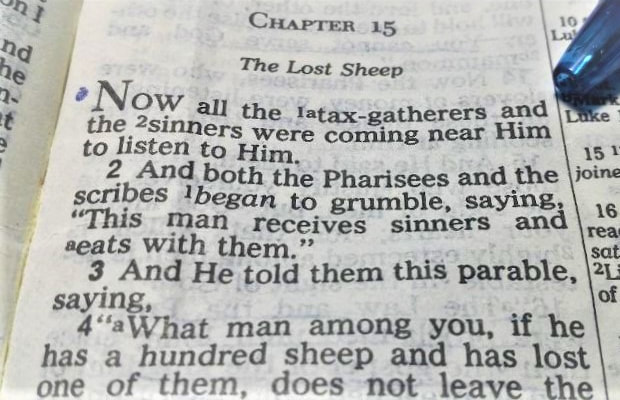

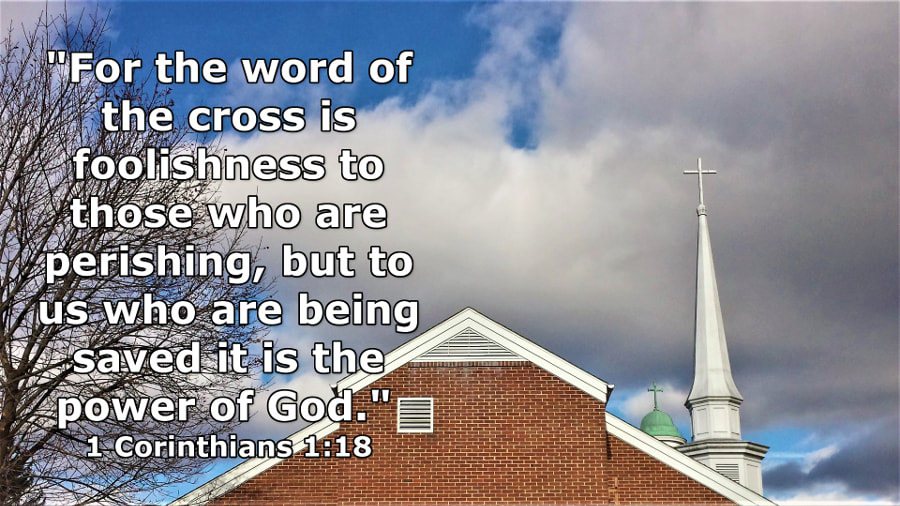
 RSS Feed
RSS Feed
